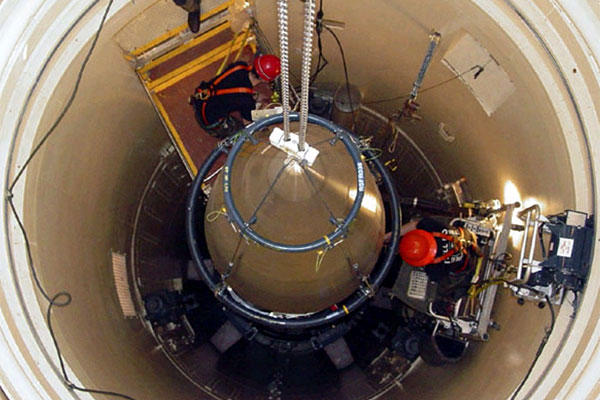An ongoing Air Force investigation of officer drug abuse has led to the discovery of the largest-ever cheating scandal in the nation's nuclear missile force, Gen. Mark Welsh, the Air Force Chief of Staff, said Tuesday.
Welsh and new Air Force Secretary Deborah Lee James said the cheating on a monthly test at Malmstrom Air Force Base, Mont., involved at least 34 missile officers.
Sixteen of the 34 officers cheated with answers they received by text message from another missile officer. The other 17 officers knew about the cheating and failed to report it to superiors, Welsh said.
"This is absolutely unacceptable behavior. I am profoundly disappointed," James said.
James stressed that investigators did not believe that the cheating affected the security or reliability of the nation's Intercontinental Ballistic Missile (ICBM) fleet.
"This was not a failure of the nuclear mission, it was a failure of our airmen," said James, who was making her first appearance in the Pentagon briefing room.
Last week, the Air Force disclosed that 10 officers -- nine lieutenants and one captain – were being investigated for illegal possession of "recreational drugs." The case began with the investigation of two officers at Edwards Air Force Base, Calif., and quickly widened to officers at other bases.
Welsh said Wednesday that the drug probe now involves a total of 11 individuals at Edwards; Schriever Air Force Base, Colo.; Royal Air Force base Lakenheath in England; Vandenberg Air Force Base, Calif., and two bases that operate ICBMs -- F.E. Warren Air Force Base, Wyo., and Malmstrom.
Welsh said that the 34 suspected of cheating at Malmstrom were involved in what has become the "largest scale cheating incident in the missile community." All 34 have been de-certified for operations with ICBMs and their security clearances have been lifted, Welsh said.
The cheating was "completely unacceptable" and "anyone who doesn't understand it should find another line of work," Welsh said.
At least two of the officers under investigation for drug abuse were also suspected of being involved in the cheating scandal, Air Force officials said.
The cheating and drug investigations were the latest incidents to raise questions about Air Force oversight of the security of the nation's most powerful weapons and the integrity of those in charge of them.
In October, Air Force Maj. Gen. Michael Carey, commander of the 20th Air Force in charge of three nuclear wings, was relieved of duty because of a "loss of confidence" in his leadership.
An Air Force Inspector General's report last month charged that Carey had been drinking heavily, fraternizing with "women" and disrespecting his hosts on a visit to Russia last year for a nuclear security exercise.
In August, 17 officers from the 341st Missile Wing at Malmstrom were temporarily relieved for failing safety and security inspections. The wing as a whole failed a key nuclear inspection that month before passing the retest in October.
In a statement at the time, the Air Force Global Strike Command said that the 17 received an "unsatisfactory" rating for "tactical-level errors" that occurred during an exercise. "This failure resulted in the entire inspection being graded ‘unsatisfactory," Global Strike Command officials said. The 17 were re-instated after additional training.
Last week, on visits to F.E. Warren and other nuclear commands, Defense Secretary Chuck Hagel acknowledged that there were morale problems in units that carry out the ICBM mission.
"They do feel unappreciated many times," Hagel said. "They're stuck out in areas where not a lot of attention is paid."
A statement from Hagel's office Wednesday said that he also was "deeply troubled" by the latest allegations and he had asked James "to update him regularly on these investigations and to make the health of the ICBM force a top priority."































